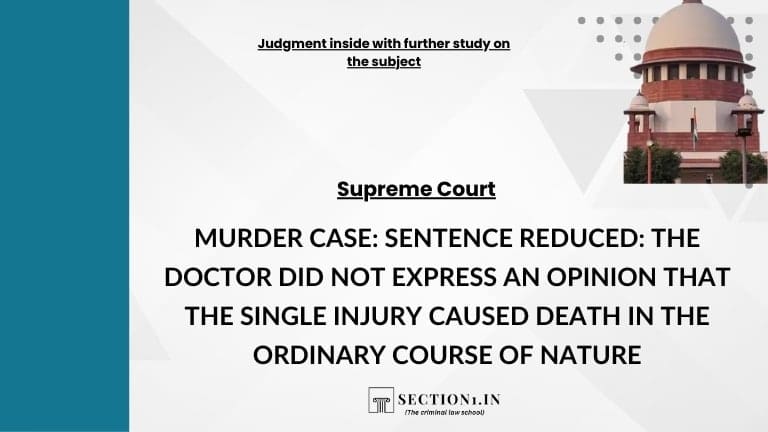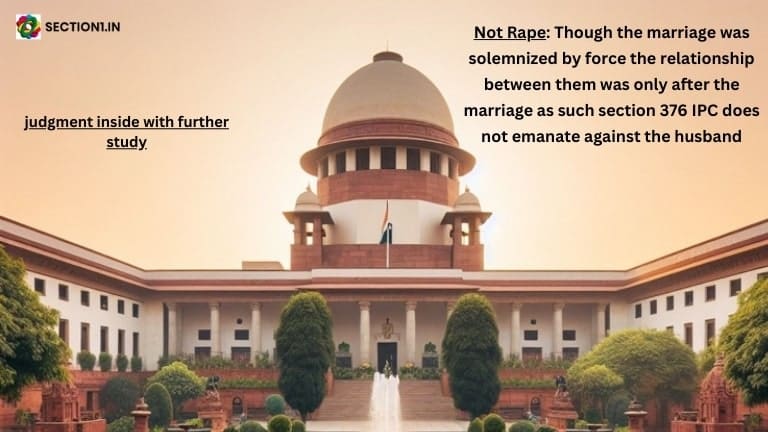FACTUAL ASPECTS
1. The appellant who was at the relevant time Lance Naik in the Indian Army was convicted by the Court Martial for the offence punishable under Section 302 of the IPC (for short, ‘IPC’) read with Section 69 of the Army Act, 1950 (for short, ‘the Army Act’). The Court Martial sentenced the appellant to suffer imprisonment for life. The Court Martial also dismissed the appellant from service. Thereafter, the appellant filed preconfirmation and additional preconfirmation petitions which were rejected by the Major General Officer Commanding by his order dated 28th September 2005. Thereafter, the appellant filed a petition to the Chief of the Army Staff who rejected the same by his order dated 12th June 2006. Thereafter, the appellant filed a Petition under Article 226 read with Article 227 of the Constitution of India and Section 482 of the Code of Criminal Procedure, 1973 (for short ‘CrPC’) before the Hon’ble High Court of Punjab and Haryana. The High Court transferred the matter to the Armed Forces Tribunal, Chandigarh. By the impugned judgment, the Armed Forces Tribunal, Chandigarh dismissed the Petition and confirmed the conviction and sentence of the appellant. Against the impugned order of the Tribunal, the Appellant again filed a Writ Petition before the Hon’ble High Court of Punjab and Haryana and by order dated 10.10.2018, the High Court while dismissing the Writ Petition granted liberty to the appellant to avail remedy under Section 30 of the Armed Forces Tribunal Act, 2007.
OUR VIEW
11. The appellant did not have a weapon at that time and he used the weapon of the deceased. Out of 20 rounds in the magazine of the rifle, he fired only one bullet. Moreover, after the incident, the appellant did not run away and he along with PW 13 lifted the deceased and laid him by the side of the road. He frankly disclosed his version of the incident to PWs 13 and 14. The appellant along with two other army men, lifted the deceased for putting him in the ambulance and he accompanied the deceased to the hospital. These facts brought on record show that there was no premeditation on the part of the appellant. Both the appellant and the deceased had consumed liquor. There was a fight between him and the deceased over the issue of seniority. In fact, when the appellant told the deceased to bring water for him, the deceased refused to do so on the ground that he was senior to the appellant. In a disciplined force like Army, the seniority has all the importance. Therefore, there is every possibility that the dispute over seniority resulted in the appellant doing the act in a heat of passion. It appears that in the heat of passion, the appellant snatched a rifle held by the deceased and fired only one bullet. If there was any premeditation on the part of the appellant or if he had any intention to kill the deceased, he would have fired more bullets at the deceased. Hence, there was no intention on his part to kill the deceased. Whether the appellant had done a cruel act or not, has to be appreciated after considering three facts. Firstly, the appellant was a soldier on guard duty, secondly, the appellant and the deceased had a fight over the seniority and thirdly, though there were 20 rounds in the rifle of the deceased, he fired only one round. There was a sudden fight over seniority when the appellant and the deceased had consumed liquor. There was no premeditation. The appellant, in the facts of the case, cannot be said to have acted in such a cruel manner which will deprive him of the benefit of exception 4 to Section 300 of IPC. The term cruel manner is a relative term. Exception 4 applies when a man kills another. By ordinary standards, this itself is a cruel act. The appellant fired only one bullet which proved to be fatal. He did not fire more bullets though available. He did not run away and he helped others to take the deceased to a hospital. If we assign a meaning to the word ‘cruel’ used in exception 4 which is used in common parlance, in no case exception 4 can be applied. Therefore, in our view, exception 4 to Section 300 was applicable in this case. Therefore, the appellant is guilty of culpable homicide not amounting to murder. The appellant snatched the rifle from the hands of the deceased and fired one bullet at the deceased. This act was done with the intention of causing such bodily injury to the deceased as was likely to cause death. Therefore, the first part of Section 304 of IPC will apply in this case. Under the first part of Section 304 of IPC, an accused can be punished with imprisonment for life or with imprisonment for a term which may extend to 10 years.
xxx
13. Therefore, the appeal is partly allowed. The conviction of the appellant for the offence punishable under Section 302 of IPC is altered to the one under Part 1 of Section 304 of IPC. The appellant is sentenced to undergo imprisonment for the term which he has already undergone. The appellant was enlarged on bail by this Court on 8th April 2020. The bail bonds of the appellant shall stand cancelled.
PARTY: No.15138812Y L/Nk Gursewak Singh vs. Union of India & Anr – Criminal Appeal No.1791 of 2023 – July 27, 2023.
https://main.sci.gov.in/supremecourt/2019/41324/41324_2019_11_1501_45419_Judgement_27-Jul-2023.pdf






